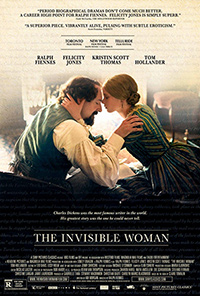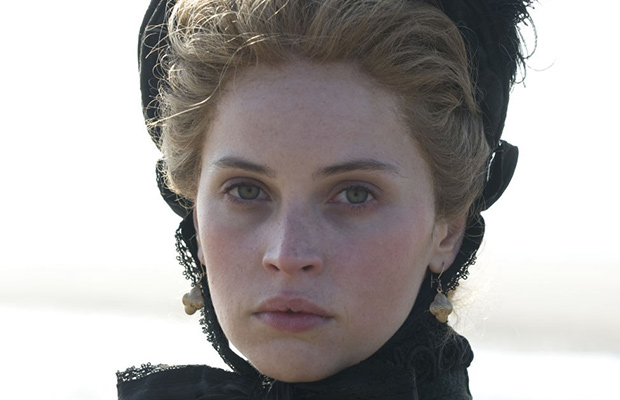Reviews
The Invisible Woman | Review
In Plain Sight: Great Expectations for Fiennes’ Sophomore Effort
 After his brash, testosterone-fueled directorial debut Coriolanus, Ralph Fiennes fares far better with the quieter, chest-heaving illicit love story of The Invisible Woman. Based on Claire Tomalin’s biography of Nelly Ternan, (who may have been Charles Dickens’ muse for the novel Great Expectations), the film centers on Dickens’ (Ralph Fiennes) torrid extramarital affair with Ternan (Felicity Jones), the details of which are unfolded in flashbacks throughout the film. Exquisitely crafted and featuring a fierce standout performance by Jones, the film is a solid sophomore item from an actor accomplishing more than a will to flex his directing muscles or switch up genres, but demonstrate a strong knack for adapting classic fiction.
After his brash, testosterone-fueled directorial debut Coriolanus, Ralph Fiennes fares far better with the quieter, chest-heaving illicit love story of The Invisible Woman. Based on Claire Tomalin’s biography of Nelly Ternan, (who may have been Charles Dickens’ muse for the novel Great Expectations), the film centers on Dickens’ (Ralph Fiennes) torrid extramarital affair with Ternan (Felicity Jones), the details of which are unfolded in flashbacks throughout the film. Exquisitely crafted and featuring a fierce standout performance by Jones, the film is a solid sophomore item from an actor accomplishing more than a will to flex his directing muscles or switch up genres, but demonstrate a strong knack for adapting classic fiction.
The film’s central narrative takes place in 1857, whereupon young actress Nelly Ternan captures the attention of married famous author and playwright Charles Dickens. Despite protestations from her mother (the criminally wasted Kristin Scott Thomas, whose presence recalls her doomed love affair with Fiennes in The English Patient), the two embark on a secret relationship away from the whispering public and from his devoted wife (played with heartbreaking pathos by Joanna Scanlan).
While the film feels at times like a cut and paste version of other ill-fated recent love stories between writers and their muses (notably Shakespeare in Love and Moulin Rouge!), Abi Morgan’s slow-paced script is heightened by Jones’ raw believable performance as the titular character. As the young woman forced to shroud and then bottle her immense aching passion and her adoration for Dickens from both society and from herself, she is able to convey her struggles with her inner unsettled demons through every melancholic look.
As with Coriolanus, Fiennes ably directs the rest of the cast but is unsure of how to capture his own performance. The camera never seems to quite know where to go, and instead, the film is left with far too many tight close-up shots that would make Tom Hooper proud. So too with Coriolanus, while the secondary characters awe and marvel at his character and accomplishments, we never quite see what the fuss is about. Fiennes is an unquestionably brilliant actor but in his two features (especially in Coriolanus, where he should have carried most of the film) his performances fall flat due to a lack of confident direction. Due to a standout bravura performance by Felicity Jones, lush cinematography by Rob Hardy, and Maria Djurkovic’s top-notch production design perfectly capturing the period, The Invisible Woman deserves to be “seen“.
Reviewed on September 9 at the 2013 Toronto International Film Festival-Special Presentations Programme –
111 mins.
Leora Heilbronn is a Toronto-based writer. Top Films From Contemporary Film Auteurs: Almodóvar (Volver), Coen Bros. (Burn After Reading), Dardennes (Lorna's Silence), Haneke (The Piano Teacher), Hsiao-Hsien (Three Times), Kar-wai (In the Mood for Love), Kiarostami (Certified Copy), Lynch (Mulholland Drive), Tarantino (Inglorious Basterds), Van Sant (Good Will Hunting), von Trier (Melancholia)






















